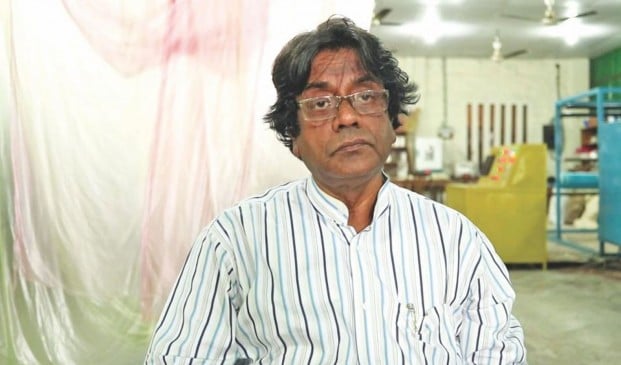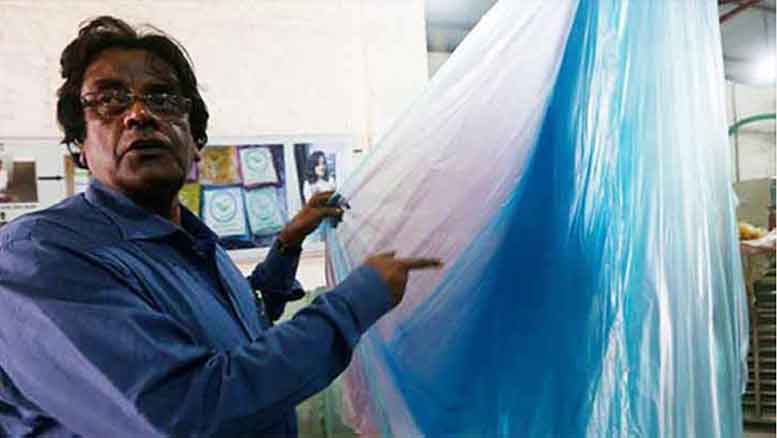Every week there’s a new statistic telling us how the Earth’s climate crisis has worsened. There’s no denying that plastic pollution has been a major factor in the planet’s environmental decline. Plastic is not biodegradable, with scientists explaining that plastics can take anywhere between a few decades to several hundred years to break down. There is undoubtedly a need for a more sustainable alternative to plastics and this is where Mubarak Ahmed Khan’s Sonali Bag has made its mark.
What is Sonali Bag?
Simply put, Sonali bags are a potential solution to a major part of the world’s plastic pollution problem. Mubarak Ahmed Khan, the Bangladeshi scientist who invented Sonali bags, describes them as a biodegradable polymer synthesized using jute. A biodegradable plastic is one that can be easily decomposed by the actions of other living organisms or biological mechanisms. This decomposition is usually carried out by microbes, converting the plastic into environment-friendly substances like water, carbon dioxide and biomass.

Thus, Sonali bags have been a very exciting proposition for environmentalists. These bags offer a sustainable solution to non-biodegradable plastics currently suffocating the planet. With almost every country worldwide looking for methods to cut down on plastic usage, the proposition of the Sonali bag offers a clean, eco-friendly, biodegradable alternative.
How did the idea come up?
A study done by the Bangladesh Jute Mills Corporation (BJMC) indicates that approximately 410 million plastic bags are used monthly in the city of Dhaka alone. Moreover, the bed of the Buriganga river has developed a three metre thick layer of plastic, indicative of the extent of plastic pollution. The waterlogging problems prevalent in Dhaka can also be attributed to over 80% of waste plastic ending up in the city’s sewage systems.

Although, this study focused on Bangladesh; plastic pollution is a worldwide concern. At least 8 million tons of plastic makes its way to the ocean every year, adversely affecting marine ecosystems with nearly 100,000 recorded cases of aquatic animal deaths annually. The need for an alternative was alarming, which inspired Mubarak Ahmed Khan to set out on his initiative to produce the jute-based biodegradable polymer back in 2010.
A Successful Pilot leads to Worldwide Jubiliation
Environmentalists, Green Activists and a lot of people had a reason to rejoice when Mubarak Ahmed Khan reported that he had managed to replicate all the properties of plastic using jute biopolymers. Although the product, named ‘Sonali Bags’, looked and felt like plastic, it was in-fact biodegradable.
It received praises from all quarters. Even Prime Minister Sheikh Hasina promoted it on that year’s World Environment Day, urging people to keep themselves away from using throwaway plastic bags and opt for the jute-made product like Sonali bag.
Why hasn’t it been widely implemented yet?
Mubarak received national recognition for his work in 2015, with the Bangladeshi government opting to fund his pilot project to manufacture the Sonali bags. By 2017, the BJMC had set up shop in the Latif Bawani Jute Mill, post which the project seems to have stalled. The BJMC produced only 2000 bags daily, as they were still operating on a trial basis with lack of adequate infrastructure and funding for larger scale production.

The Sonali bags are better than regular polyethene bags on all fronts: stronger, recyclable, reusable and biodegradable. Yet, Mubarak is critical of the lack of funding to scale up his project and shift to mass production.
“The pilot project has been completed successfully but commercial production is yet to begin”
Mubarak Ahmed Khan
Government officials, on the other hand, argue that Mubarak never informed them on completion of the pilot project. In the words of BJMC Chairman, Abdur Rauf
“Usually, he does not share anything about the technology. He even did not let us know what he intends to do now”, says Abdur Rauf
Abdur Rauf, Chairman of BJMC
This breakdown in communication is primarily responsible for the lack of any tangible progress in the Sonali bag project. Mubarak is afraid of losing his control over the project.
“Why should I share my details? It’s my own intellectual property. I have invested years on this.”
Mubarak Ahmed Khan
Over the last year, the Sonali bag project has received Tk10 Crore from the Bangladeshi Climate Change Trust Fund. This investment, Mubarak says, proved useful in buying manufacturing machinery and chemicals, but is insufficient for increasing the scale of production. He further adds that a minimum investment of Tk400 crore would be required in order to shift to commercial production.
“You have to understand that we are now ready and we are waiting for a big investment for commercial production of these bags.”
Mubarak Ahmed Khan
Since the BJMC itself is currently stretched for funds, Mubarak has since been appealing for fresh investments to no avail.
“It will need a new project proposal and it will have to be passed in the Executive Committee of National Economic Council (ECNEC). I don’t know why the initiative is not being taken up.”
Mubarak Ahmed Khan
How long till we see biodegradable plastics?
The BJMC has been looking into means to promote the commercialization of their project but so far, haven’t been successful. Yet, the invention of the Sonali bag has been a source of hope to many with several other countries worldwide also pushing for more eco-friendly alternatives to plastic. Biodegradable plastic alternatives have started to emerge in several parts of the world. The next step is widespread adoption.

According to a BJMC Brochure for the Sonali bag, some companies have already shifted towards using biodegradable packaging based on starch or bioplastic compounds. They further add that BASF, a German multination chemical company, does currently manufacture a biodegradable polyester that is widely used in food packaging applications. Mass production of Sonali bags is still something to look forward to though, as having more options will only make it easier to completely replace the use of plastic in day-to-day life.
